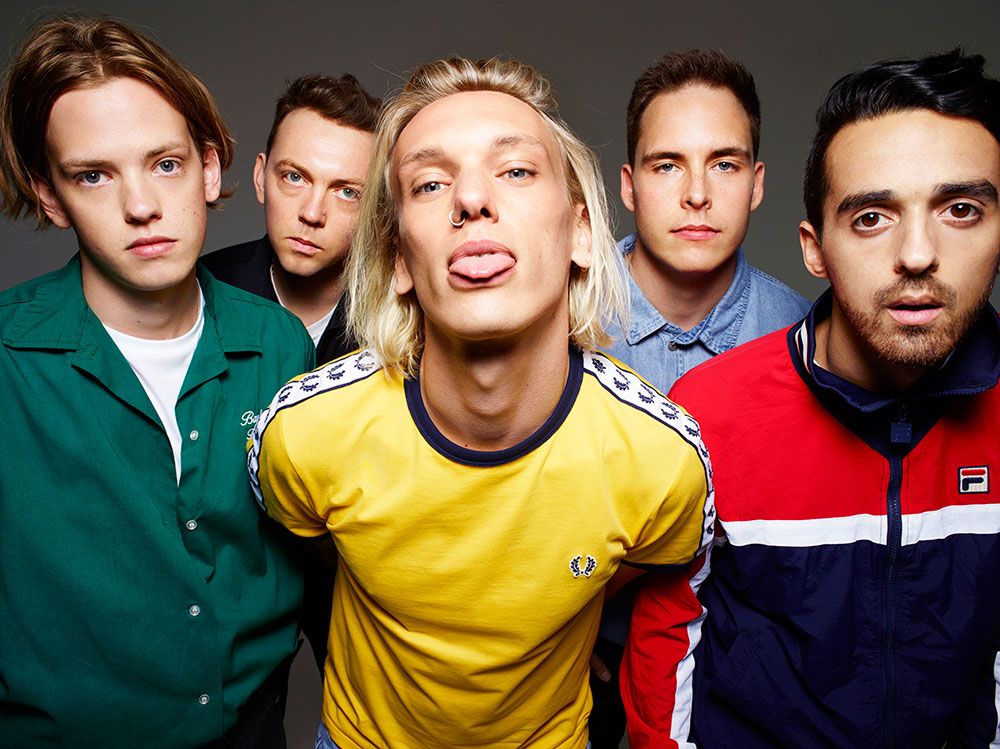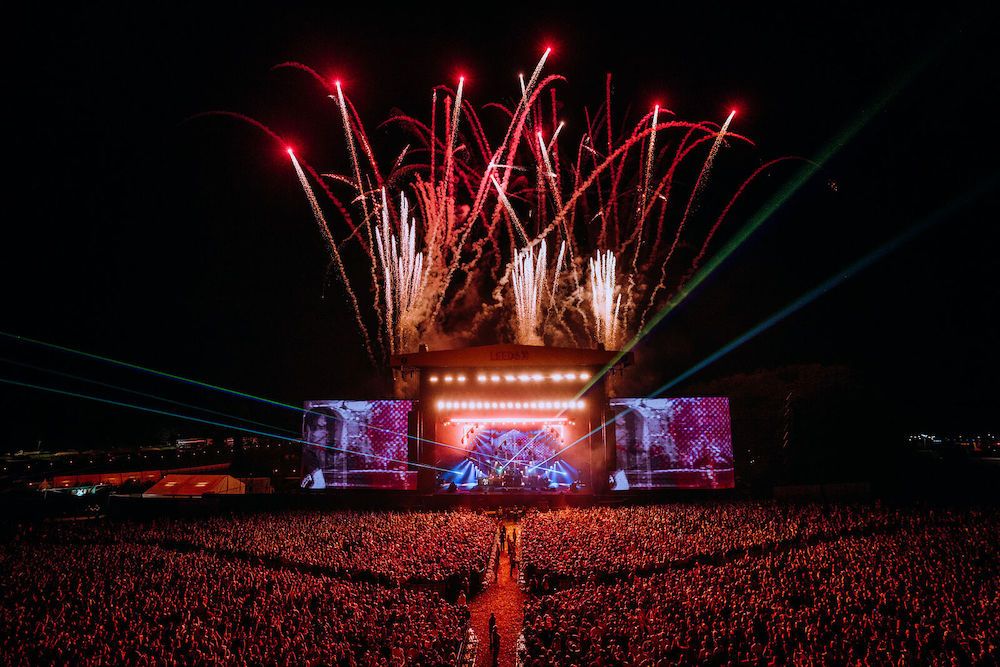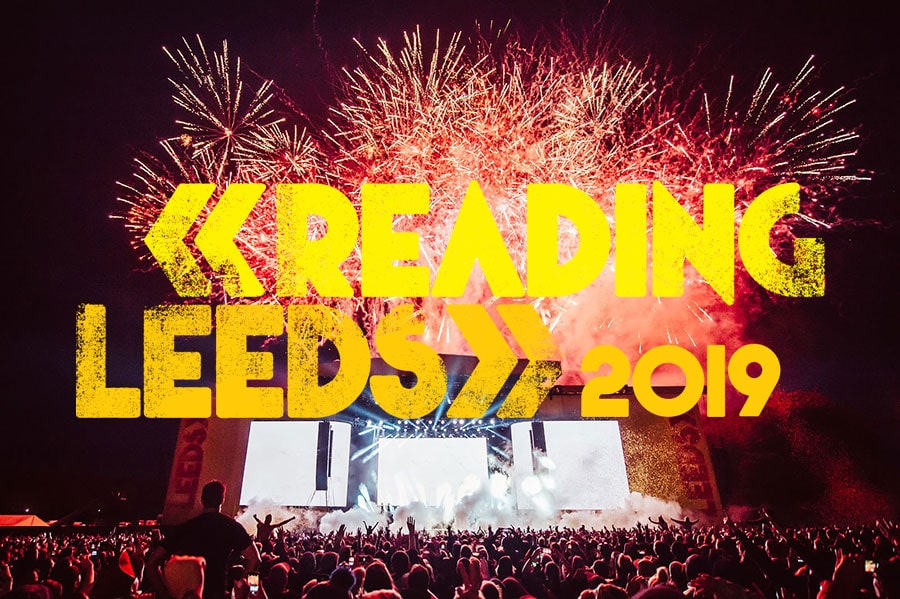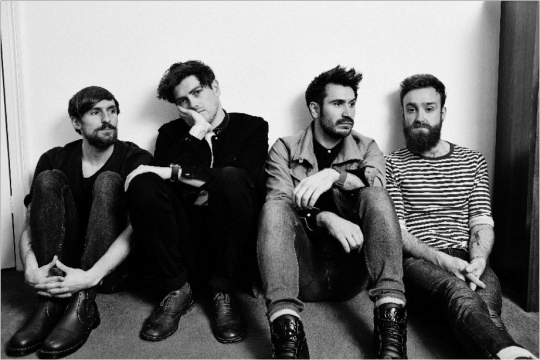
There isn’t really any denying that Glasgow’s Twin Atlantic are one of the biggest Rock Bands to have broken into mainstream awareness in the last decade. The quartet’s inexorable rise continues to seem utterly unstoppable, and saw them get the penultimate slot on the NME/BBC Radio One Stage at last month’s Reading and Leeds Festivals. Already Heard was able to catch up with frontman Sam McTrusty a few hours before their Leeds appearance to discuss the band’s decision to bring the touring cycle of current album ’Great Divide’ to a swift end, hear his blunt assessment of how his own narcissism sets him apart from his fellow Scots, having lofty goals from the get go, oh and the whole other people singing in his accent thing…
AH: It looks like you guys had an absolute blast at Reading yesterday, how was it for you?
Sam: It was fucking weird man. We’ve now played these festivals for five years in a row, and I don’t know if other bands have been allowed to do that or why they keep having us back, but we had an expectation was that nobody would turn up the way they have the last few times. Because we’ve just milked. We were like ‘we shouldn’t have come back’, but it was the best one that we’ve ever done. We kind of freaked out on stage and it was amazing.
AH: If you get the same kind of scenes tonight, what a way those two shows would be to end the ‘Great Divide’ touring cycle.
Sam: I know. Tonight is officially the last show for the album. I had a moment on stage last night where I was, not emotional, but overwhelmed by how much we’ve managed to do in such a short amount of time. It sounds cheesy but I’m fucking glad we’re finishing here because the Leeds crowds are usually so up for it. It feels like a part in general so I’m pretty pumped.
AH: It seems like this whole album cycle has come to an end incredibly quickly, is that a conscious decision?
Sam: It is totally on purpose because with our last album ‘Free’ the whole process was a four year thing. It took us a year to record it, then release it and then we toured it for three years because we didn’t really plan for it to go so well. But it kept doing better and better and better, and Radio One kept adding singles to their playlist. We loved that, and it gave us the chance to make another album, but at the same time it was a bit creatively stifling. It didn’t really give us the chance to just be a band. By the end we became like performing monkeys over and over again. It made us hate some of the bits about being in a band and we don’t want to have a shit time. That was why we were like lets do 18 months in and out and get it done.
AH: With most of ‘Great Divide’ being written on tour while America, what kind of effect did that have on your writing and the way you were thinking about the songs?
Sam: Loads, pretty much half of it was written in America. We would get to venues really early because of the driving hours and all we would have in our van, because I didn’t have music on my phone and there’s only so many times you can listen to your iPod over and over again, would be to put American radio stations on and it was all classic songs like ‘Johnny B Good’ and stuff like that all day. That definitely went into our sub-conscience a wee bit. I think the album sounds really happy because we were loving being on the road, meeting new people every day and just having the time of our lives. I think that’s why the album sounds so upbeat.
AH: Was there a similar influence from the scale and size of venues you were playing at the time too?
Sam: That was a big deal as well although it was mostly from playing with other bands. It’s not like I was literally taking notes, but you soak things in. On the ‘Free’ cycle we played shows with the likes of Foo Fighters, Kasabian and Bruce Springsteen at festivals and stuff. And you see what songs work and what songs don’t and we toured with Blink-182 a couple of times. You’d be crazy not to notice what songs work in that size of room and what songs don’t. So when we went to shape our own songs it was already a subconscious thing that we’d taken in. I guess when we were writing the vocals and writing the songs we had a lot of that in mind.
AH: Will you be taking a different approach to album three and taking a brak to focus on writing?
Sam: To go back to one of your other questions, that’s why we’re ending this album cycle so quickly. We want to react to how we feel about the last album and literally do the opposite. When you do the same things over and over again it makes you want to do something different. Even the way we’re writing the songs is completely different. Ross our bass player for the first time is contributing songs with lyrics which we’ve never had the time for him to do properly. So it’s going to be really different and I’m nervous because people might fucking hate it. But at the same time that makes me feel alive and that’s what being in a band is about. I can’t wait for people to hear what we’ve got.
AH: Normally you’d expect there to be less pressure on the writing for this album, as bands say album two is the hardest one to write, but if you’re mixing things up so much we’re guessing that won’t be the case?
Sam: We put too much pressure on ourselves for everything. (laughs) Every little detail we focus on. But we learned a long time ago that you can’t make everyone happy with music. You can’t impress everyone. The fact that even a handful of people are like minded and like it, that’s good enough for us. The rest of it is just the magic of being in this band. We’re really spoiled and lucky to have so many fans and really passionate fans. Yeah it’ll be difficult, but if it was easy we’d make something shit. The pressure of it being difficult challenges us, you shit yourself but then really focus to create something good.
AH: How did working with Gil (Norton, producer) and the experience he has of working with massive bands help you to sound like a massive band yourselves?
Sam: (Laughs) I’m laughing because that’s a big compliment so thank you! It was life changing man. Really life changing. It was like having a fucking amazing teacher at school who actually understood you. Like having a cool art teacher who just let you draw and paint all day. That was my cool teacher experience. He just understood what it was like to be from Glasgow as he grew up in Liverpool. We had all these sorts of similarities and he was able to just tap into my brain and make me a better version of what I was before I met him. Even being in a room with him is inspiring because you know the history that he’s been involved with. I wanted to impress him and it even changed how I hear music. He’s had thirty years’ experience, so he’s made all the mistakes years ago. It was like having someone come in and organise you. It was amazing.
AH: We heard that being a band from Glasgow helps to keep you grounded, as the locals and your friends won’t let you get big headed as Scottish people aren’t allowed to enjoy being successful…
Sam: No, you’re not! (laughs) Part of it is frustrating because I’m a show off. I’m a pure narcissist nutcase. I want people to be like ‘You’re amazing!’ A big part of it is that Scottish people in general are quite self-deprecating. We’re so used to being the underdog that when someone does well you’re out of your comfort zone. So you run back to people knowing they need to bring you down a peg or two. It’s helped us stay cynical and stay real, like normal people. I still live in the same mile radius as the bit of Glasgow that I was born and raised in. It’s not like we’ve moved to London now we know all the music industry people or any of that bull shit. It helps you keep doing things for the right reason, if you have people around you all day who are going ‘You’re amazing, you’re amazing’, you start to believe it. And then you don’t really try.
AH: We’ve been to plenty of your shows in different parts of England and still find it odd hearing crowds sing the words back at you in your accent? Is that a surreal thing to experience and is it just the UK where it happens?
Sam: It happens everywhere, it honestly happens everywhere. Sometimes you get a wee bit of an English accent, which I prefer just because it’s refreshing if you know what I mean. But then I singalong to someone who has a strong accent, like Tom Delonge, I sing it like him. So I understand why it happens. It’s funny.
AH: One of things that your writing is known for is the big chorus hooks, how do you approach writing them?
Sam: I don’t think a song is finished until it has a moment that feels like a payoff. If I’m going to draw you into a song with an interesting intro or a verse with good lyrics, I feel like you deserve the elevated moment. I don’t know why that’s becoming our style and our thing, because it can be quite cheesy sometimes. We don’t even listen to a lot of music that actually does that. I think it just feels more accomplished, like tying a bow on it, if you know what I mean. I don’t really know what my approach is to that. It just kind of happens, which is lucky.
AH: Are you aware of how many people have tipped you to be possible future headliners of this festival?
Sam: I am now! I’m ready man. If someone pulled out we’d do it today. When we started the band we’d never done interviews obviously, and one of the first ones we did was for Kerrang for their introducing page. It says in that ‘what’s your aspiration for the band?’ and from then, from the start, I’ve been saying we want to play stadiums and we want to headline festivals. If you set the bar that high and you fall somewhere in the middle then that’s still around what we’re doing now which is awesome. Imagine getting to do that, it would be such an honour. It would make my life and make everything worthwhile. The bigger the shows get the more fun we have. We definitely think that if people want to think or suggest that then we’re ready to try and do it.
AH: So say hypothetically a promoter said to you at the start of a festival season ‘you can headline T in The Park, or you can headline Reading and Leeds’, which would you choose?
Sam: Probably T in The Park. It’s an internationally known festival. When we go to America people know what T in The Park is, but not as much as Reading and Leeds. That’s a hard question. I’ve got more emotional attachment to T as it’s my hometown festival and it’s where I went as a teenager. That was one of our other things when we started out, ‘lets headline T in The Park’. There has to be Scots other than Biffy or Paulo (Nutini) or Calvin Harris who all did it, who can. We could be a band to do it. That’s a good question that I’m struggling to answer, but I think honestly T in The Park.
: When you’re planning setlists now, do you feel obliged to include ’Crashland’ because so many people have a connection with that song?
Sam: Not really. We do play sets without it. It was very nearly not in this set, because it’s a festival and people want to have a good time. But a lot of people have their best fun singing along to that. We love the song and we love having people sing it that loud. So it’s cool with me.
AH: On ’Great Divide’ did you include the song ’Oceans’ with the intention of it having that same kind of vibe?
Sam: Not when it was written. When it was written it was this weird kind of spiritual moment where the song just flowed out of me in ten minutes. The words, everything was there. Afterwards we were like this song does have that same feeling and the album’s missing that. It worked with ‘Crashland’ so we can try it with this. So yeah we were comparing the two and saying that for a headline set it would be good to have another song like that for the ebb and flow of the set.
AH: Do you find it hard to keep track how much your band keeps growing year on year?
Sam: We don’t understand man. We talk the talk a lot and we talk ourselves up. Well I do, the other guys are modest. I try and push people’s expectations of our band by just talking them up a bit. And it keeps working. It definitely has hit us harder than ever at Reading and Leeds this year because all what I consider are all the cool massive bands like Catfish and The Bottlemen, Foals and Everything Everything are coming up to us this year and being like ‘hey, how are you doing?’ and we’re like ‘well that never used to happen’. So with that, and us playing at night, we’ve even noticed this time around ‘fuck somehow we’re a little bit bigger again’. We’re really lucky because that doesn’t happen to every band.
AH: How much does it mean to you to have been able to kick that door open so that people are paying attention to Scottish rock bands other than Biffy, meaning bands like Fatherson and Prides can follow you through?
Sam: It makes me feel weird, because that’s the sort of feeling I had for Mogwai and Biffy and Aereogrammes, a band that toured a lot back in the day. There’s another band called Model Aeroplanes that just signed a major deal thing, and they were another support band of ours. We want to give back in the same way that Biffy gave us a chance to tour with them eight years ago. We just like and enjoy having Scottish people with us on tour, that’s the real answer!
‘Great Divide’ by Twin Atlantic is out on now on Red Bull Records.
Twin Atlantic links: Website|Facebook|Twitter
View more of Already Heard’s coverage from Leeds Festival 2015 here.
Words by Dane Wright (@MrDaneWright)
